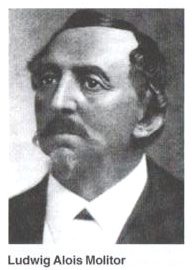Ludwig Alois Molitor
Ludwig Alois Molitor (born July 12, 1817 in Zweibrücken ; † January 12, 1890 there ) was a Bavarian judicial officer, composer, local historian and author.
Life
Ludwig Molitor was born as the son of the appellate judge Joseph Alois Molitor (1775–1848) and his wife Aloysia geb. Mayer from Mainz . His only brother was the Speyer cathedral capitular and writer Wilhelm Molitor (1819-1880).
Molitor attended elementary school and from 1828 to 1835 the Herzog-Wolfgang-Gymnasium in Zweibrücken, studied law in Munich and Heidelberg from 1835 to 1839 and successfully passed both state exams. In 1844 he became a supplementary judge at the district court of his hometown, in 1845 district court assessor there, in 1852 district judge and in 1865 appellate judge . Most recently, he worked as an appellate judge in Zweibrücken.
In 1846 the lawyer married his wife Katharina Elise b. Zott (1826-1912). The forty-four year marriage had five children. At the end of 1857, the couple from Frau von Mannlich bought a house at Herzogstrasse 8 in Zweibrücken, on which a third floor was built in 1881.
On New Year's Day 1884 he was awarded the Knight's Cross 1st Class of the Order of Merit by St. Michael . In the same year he retired for reasons of age. In 1888 the Zweibrücken city council made him an honorary citizen . A street in Zweibrücken bears his name.
Ludwig Molitor died in 1890 and was buried in the Zweibrücken main cemetery, where his grave has been preserved (2014). The "Mannlichhaus" in the Zweibrücker Herzogsvorstadt (Herzogstrasse 8 in Zweibrücken) owned by the Gehrlein-Fuchs Cultural Property Foundation serves as a memorial to the two Zweibrücker personalities Johann Christian von Mannlich and Ludwig Molitor.
Special work
In addition to his job, Molitor was particularly interested in music, acting, drawing and local history. As a young man he often appeared as an actor in amateur theater. He played the piano and cello. He also worked as a conductor and composer. In 1845 he composed the "Missa Dominica" which he dedicated to the Speyer bishop Nikolaus von Weis . Further compositions such as a Te Deum , a Stabat mater , the “Resurrection Mass” and a Missa pro defunctis followed. The list of his tone poems lists 28 works. He was also the musical director of the Liederkranz Choral Society in Zweibrücken.
Between 1861 and 1890 Molitor published several books on the history of his hometown and the Duchy of Pfalz-Zweibrücken . The list of his publications names 13 works, some of which he illustrated with his own drawings. His main work "Complete history of the former Palatinate-Bavarian residence town of Zweibrücken" (Zweibrücken 1885) appeared again in 1989 as a facsimile reprint ( ISBN 3-924171-04-1 ), as well as three other books ( ISBN 3-924171-07-6 ) .
He was also committed to the preservation of the Zweibrücken Castle and the building of the Holy Cross Church for the Catholic community.
A letter from Ludwig Molitor to the poet Hermann Lingg written in 1886 is kept in the Bayerische Staatsbibliothek .
literature
- Carl Pöhlmann: Ludwig Molitor. Zweibrücken's historian. In memory of the 100th anniversary of his birthday. Zweibrücken 1917, facsimile reprint n.d.
- Victor Carl: Lexicon of Palatinate personalities. Hennig Verlag, Edenkoben 2004, ISBN 3-9804668-5-X , pp. 591-592.
Web links
Individual evidence
- ^ Franz Xaver Remling : History of the Bishops of Speyer , Volume 1, P. 27, Mainz, 1852; (Digital scan)
- ↑ Mannlichhaus at barockstrasse-saarpfalz.de
- ↑ Pöhlmann 1917, p. 24f.
- ↑ Pöhlmann 1917, p. 25ff.
- ^ Letter from Ludwig Molitor to Hermann Lingg (Zweibrücken, March 15, 1886) in Kalliope
| personal data | |
|---|---|
| SURNAME | Molitor, Ludwig Alois |
| BRIEF DESCRIPTION | Bavarian judicial officer, composer, local historian and book author |
| DATE OF BIRTH | July 12, 1817 |
| PLACE OF BIRTH | Zweibrücken |
| DATE OF DEATH | January 12, 1890 |
| Place of death | Zweibrücken |

